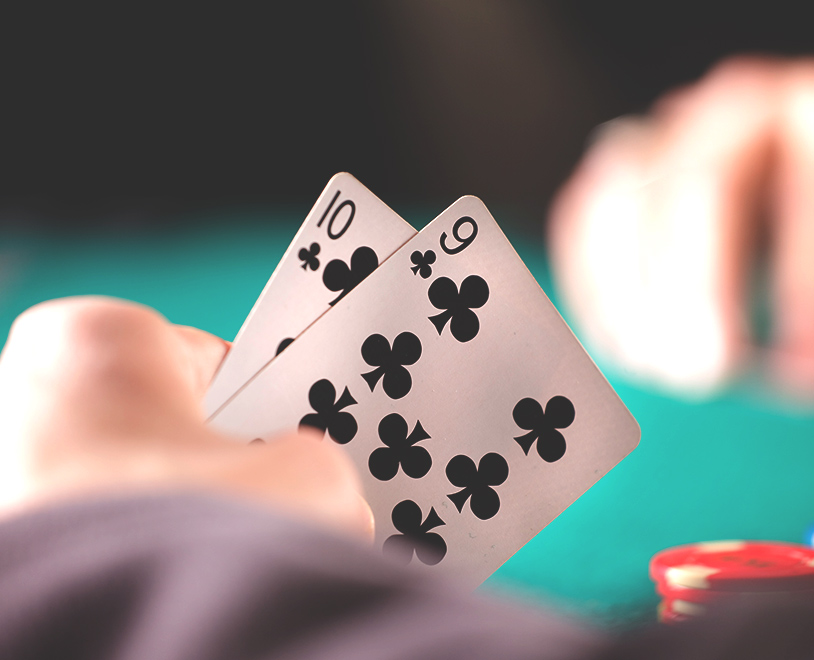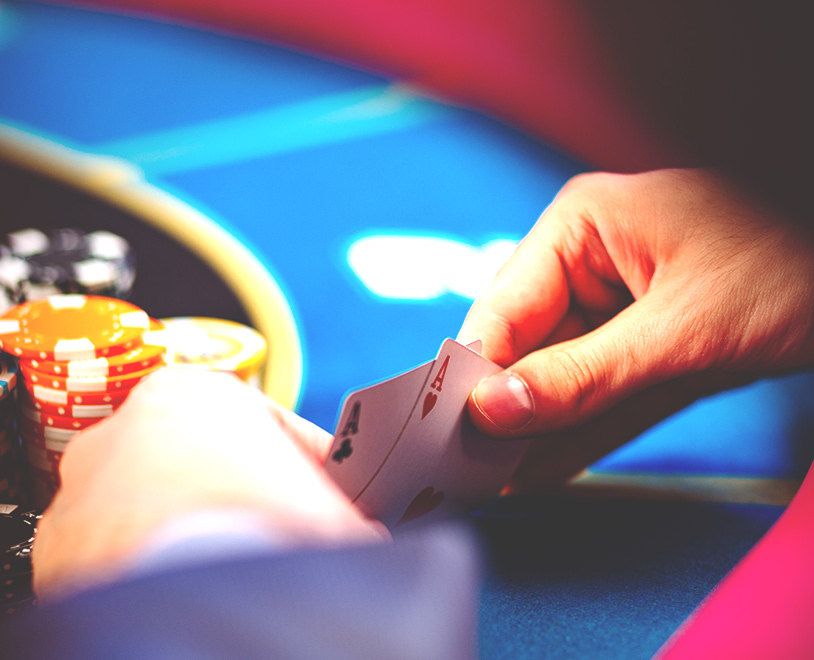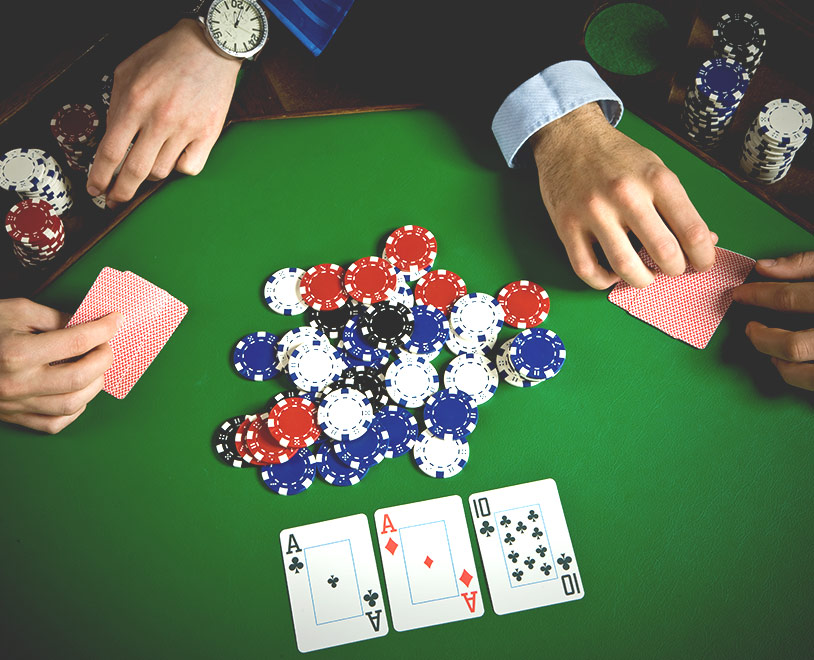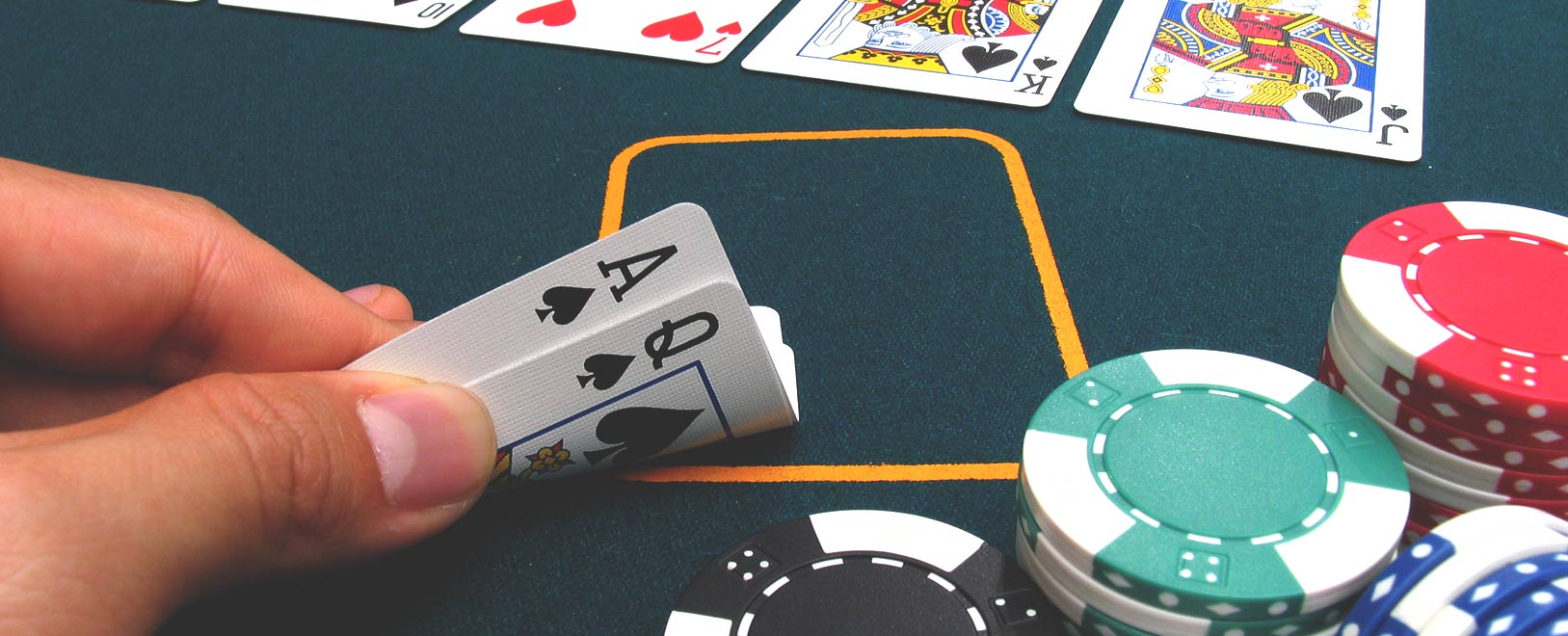Tom “durrrr” Dwan is one of the greatest poker players of our generation. He’s fearless when it comes to betting without a made hand, and for good reason – as Dwan said a few years back, it’s hard to make a pair when you’re playing Texas Hold’em. In the long run, if you want to win at this game, you have to be willing to push your chips in the middle even when you’re holding complete air. Having said that, you’ll make even more money at Hold’em when you get dealt a made hand right off the bat. Playing pairs in online poker is a skill all its own; in this guide, we’ll show you how to win with pocket pairs, from pre-flop all the way to the river. If you can get these winning habits ingrained in your poker brain, you’ll be one step closer to owning the felt like Dwan himself.

What Are Pocket Pairs in Poker?
When we talk about the pocket in Hold’em, we’re talking about your hole cards – the two cards you’re dealt pre-flop. And of course, a pair is any two cards of the same rank. Put those together, and you get pocket pairs, everything from pocket Aces (AA) to pocket Deuces (22). If you get dealt a pocket pair, you’re guaranteed to have a made 5-card hand when the flop comes out. This is a powerful situation to be in; if you don’t start with a pocket pair, your chances of making a pair on the flop are only 32.43%. At the same time, you’re not going to be dealt pocket pairs that often. It will happen just once every 17 hands (5.88%), so you’d better know how to win with pocket pairs once you’re dealt those magic cards. Let’s start building our pocket pair strategies by looking at the relative strength of each pair you’ll meet on your poker journey.
Big Pairs vs. Small Pairs
As you may already know, there’s nothing better than getting dealt two shiny Aces pre-flop. These are the pocket pairs most likely to win in Hold’em. The biggest pair you can make is Aces, so for anyone to beat your hand post-flop, they’ll have to make at least two pair. In terms of strength, pocket Aces has 85.20% equity against two random hole cards, meaning you’d expect to win 85.20% of the pot, on average, if you and your opponent went all-in before the flop.
It’s always nice to get dealt pocket Kings, too. They’re not quite as strong as pocket Aces, but they still have 82.40% equity versus two random cards. These are pocket pairs that win often enough for you to be comfortable going all-in before the flop in just about any situation. Even pocket Queens (79.92%) hold up reasonably well if you shove all your chips in the middle. And despite what you may have heard, pocket Jacks (77.74%) are excellent cards to get dealt pre-flop. All these starting hands, plus pocket Tens (75.01%), are considered “big pairs” in Hold’em. Life gets trickier the further you move down the ladder. Medium pairs (99-66) have less equity than the big pairs, and small pairs, aka baby pairs (55-22), are weaker still. You’ll need different pocket pair strategies for each category, which we’ll get to in a moment; for now, here are the equities for each of these lower pairs against two random cards:
Nines: 72.06%
Eights: 69.16%
Sevens: 66.24%
Sixes: 63.28%
Fives: 60.32%
Fours: 57.02%
Threes: 53.69%
Deuces: 50.33%

Pocket Pairs vs. Overcards
The reason these equities get smaller as the pocket pairs get weaker can be expressed in one word: overcards. These are any cards of a higher rank than your pair. If you have pocket Kings and your opponent has Ace-Queen, they have one overcard (the Ace) to your KK. When an Ace comes out on the flop, turn or river, your Kings will get cracked. You still have 70.88% equity against AQ, but that’s down significantly from 82.40% against any two napkins. Turn those pocket Kings into pocket Jacks, and you can see why people get nervous when they get dealt JJ pre-flop. Now you have all sorts of hands that contain not one, but two overcards to your hand: AK, AQ and KQ each have six outs to beat you, and your opponent might also have AA, KK or QQ. It’s not as bad as it looks, though. Pocket Jacks are still a small favourite over those unpaired hole cards:
JJ vs. AK: 56.15%
JJ vs. AQ: 56.22%
JJ vs. KQ: 55.77%
Granted, those overpairs have your pocket Jacks crushed. Anytime you’ve got a smaller pair than your opponent, you’ve got a bit less than 20% equity in the hand. However, there are only 18 possible combinations of AA-QQ (six of each pair), and 16 different ways to make each of AK, AQ and KQ, so again, you’re not in such bad shape with pocket Jacks. It’s the lower pairs you should be more concerned about.

Pairs and Position
In addition to the strength of your starting hand, your position at the table will determine how aggressively to play these pocket pairs pre-flop. All the equities we’ve discussed to this point are when you’re up against a single opponent. Once you get into a multi-way hand, you’re inviting more overcards into the pot, making it more likely that your pocket pair will get cracked. Even your pocket pairs most likely to win, those beautiful Aces, are more vulnerable multi-way than heads-up.
Because of this, it’s usually a good idea to fold those baby pocket pairs pre-flop when you’re in early position, especially in a full-ring cash game or in the early rounds of a tournament. Holding pocket Deuces out of position in a multi-way pot is no fun; even if you make a set on the flop, you have the lowest set possible. Stick with big pairs only in early position, then widen your range as you get closer to the button, and/or when you find yourself in a tournament with a shorter stack. Cash games afford you the opportunity to chase smaller edges with smaller pairs – tournaments are about survival.
Position will also determine whether you should raise, call or fold with your pocket pair after someone else enters the pot. As a rule of thumb, you can 3-bet your big pairs from any spot at the table, and you can call with your medium pairs when you’re on the button, which guarantees you’ll have position post-flop. Only call with your small pairs when you’re in the big blind and getting a good price to set-mine – never call from the small blind. It will take a little more research and study to develop good pre-flop strategies for things like 4-betting, squeezing, and calling 3-bets. Ideally, you should also adjust your ranges to take advantage of your opponents and their style of play. But if you start with these basic rules, you’ll cover most of the pre-flop situations you’ll run into when you get dealt a pocket pair.

How to Play Pairs Post-Flop
Getting your pre-flop strategies down pat is the best way to ensure success post-flop. Poker gets more difficult to figure out once the community cards are dealt; Aces are still the pocket pairs that win most often, so if you were the aggressor before the flop, it’s usually best to continue that aggression after the flop. The more potential overcards you introduce with lower pairs, the more careful you have to be.
Even if you’ve been playing poker for a while, it’ll feel like a punch to the gut when you’re in a hand with pocket Kings and an Ace comes out on the flop. There used to be plenty of debate about whether or not to fire a continuation bet in this situation, but thanks to solvers, we now know the answer is usually to check. That c-bet is more useful when you’re trying to get multiple overcards to fold after they whiff the flop. For example, if you have pocket Eights and the flop comes Ten-Five-Three, a c-bet might get your opponent to fold hands like Ace-Jack or King-Queen, denying them the chance to make a higher pair than yours. If you do the same with pocket Kings on an Ace-Five-Three board, there are no overcards your opponent could have that didn’t pair up already.
As you play more hands of poker and you continue your journey from beginner to intermediate to Dwan Mode, you’ll find more and better ways to play your pocket pairs – including one of the more advanced plays in Hold’em, turning a small or medium pair into a bluff on the river. But for now, you have all the fundamentals you need to get the most value out of those beautiful pairs. You know their relative equities from Aces to Deuces, and you have a basic strategy for what to do with them before and after the flop. Good luck at the tables.
